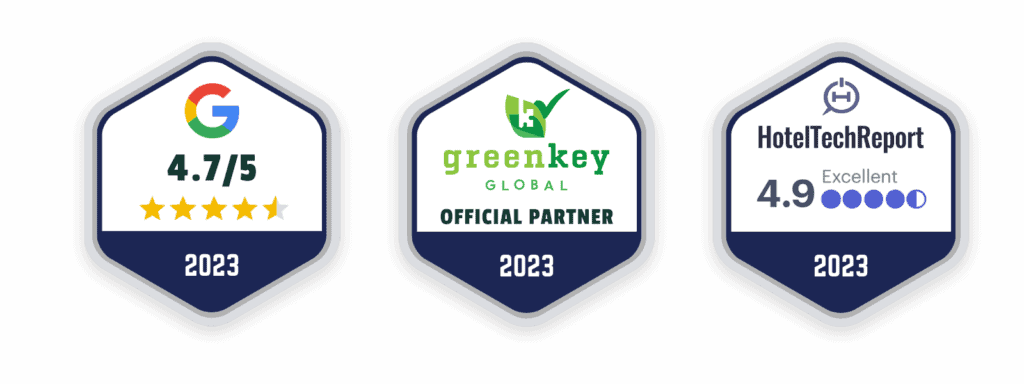Imagine it’s peak season, and your hotel is almost full—yet a few cancellations or no-shows threaten your occupancy rates. How can you ensure your hotel remains fully booked? Enter hotel overbooking—a widely used strategy that has its benefits but also comes with risks. In this post, we’ll dive into the pros, cons, and best ways to manage overbooking without disrupting guest satisfaction or your hotel’s reputation.
Key Takeaways
- Maximize occupancy by overbooking strategically to account for cancellations and no-shows.
- Data-driven insights are key to managing overbooking without exceeding capacity.
- Prioritize loyal guests and use clear communication to keep guest satisfaction high.
What is Hotel Overbooking?
In simple terms, hotel overbooking is when a hotel accepts more bookings than it has available rooms. This strategy is used to account for cancellations, no-shows, and early checkouts—common occurrences in the hospitality industry. By overbooking, you can ensure rooms don’t sit empty and your revenue remains steady.
The key is balance. Overbook by just the right amount, and you’ll maximize your occupancy and profits. Overdo it, and you risk dissatisfied guests, bad reviews, and a dent in your hotel’s reputation.
The Pros of Hotel Overbooking
1. Maximizing Occupancy and Revenue
The main reason hotels overbook is simple: to avoid losing money from empty rooms. By taking a few extra reservations, you can keep occupancy high, even when some guests cancel or don’t show up. This translates into increased revenue, especially during busy seasons or events.
2. Compensating for No-Shows and Cancellations
No-shows and last-minute cancellations are inevitable in the hotel industry. Overbooking provides a safety net—you’re essentially hedging your bets against these losses, ensuring that the rooms you counted on being occupied still generate income.
3. Efficient Use of Resources
Operating a hotel comes with fixed costs—housekeeping, maintenance, utilities—that don’t fluctuate with occupancy. When you overbook and fill more rooms, your staff and resources are used more efficiently, helping to justify those expenses.
4. Revenue Optimization
For hotels utilizing revenue management strategies, overbooking can be a powerful tool. By analyzing guest behavior and booking data, you can predict how many guests will cancel or no-show and overbook accordingly. This allows you to optimize room rates and maximize revenue without negatively affecting guest experience.

The Cons of Hotel Overbooking
While overbooking can boost profits, it’s not without its challenges. Mismanagement can lead to significant problems, especially regarding guest satisfaction.
1. Guest Dissatisfaction and Reputation Risks
The biggest risk with overbooking is turning away guests who arrive with a confirmed reservation. This situation often leaves guests frustrated and can result in negative reviews on platforms like TripAdvisor or Google. Even worse, these reviews can influence potential future bookings.
2. Compensation Costs
When you can’t accommodate an overbooked guest, you’ll need to offer compensation, which might include rebooking them at another hotel, covering transportation, or providing additional perks. These costs can quickly add up, sometimes outweighing the extra revenue you gain from overbooking.
3. Impact on Guest Loyalty
Turning away loyal guests or VIP members due to overbooking can damage long-term relationships. These are your most valuable customers, and if they feel undervalued, they may not return. Protecting these relationships should be a priority when managing overbooking.
Ready to increase your guest experience?
Best Approaches to Managing Hotel Overbooking
So, how can you overbook strategically while minimizing risks? Let’s explore some best practices.
1. Use Data to Inform Your Overbooking Strategy
Overbooking shouldn’t be a guessing game. Successful hotels rely on data-driven insights to make informed decisions. By analyzing historical data—like cancellation rates and no-show patterns—you can safely overbook by an appropriate margin.
Consider implementing revenue management systems or utilizing your booking software to gain insights that can help you overbook strategically without risking guest dissatisfaction.
2. Communicate Clearly with Guests
Communication is key when managing overbooking. Offering flexible cancellation policies and sending reminders ahead of time can reduce last-minute cancellations. Additionally, be transparent with guests if there’s a possibility that their booking may be affected by high demand.
If you do need to relocate a guest, how you handle that interaction matters. A sincere apology, clear explanation, and swift action to provide alternate accommodations can turn a negative experience into a positive one.
3. Prioritize Loyal Guests and VIPs
When it comes to overbooking, loyalty members and VIP guests should always be prioritized. These customers bring the most long-term value to your hotel, and their experience should never be compromised. Make sure they receive the best service and that overbooking does not negatively impact their stay.
4. Build Partnerships with Nearby Hotels
One of the most effective strategies for managing overbooked guests is having a reliable network of nearby hotels. Establish partnerships with trusted properties so you can seamlessly relocate guests when necessary. This not only minimizes inconvenience for the guest but also protects your reputation.
5. Offer Incentives for Voluntary Relocation
Instead of waiting for an overbooked situation to escalate, offer incentives for guests who voluntarily switch their booking dates or agree to stay at another location. Perks like future discounts, upgrades, or additional loyalty points can make the offer more appealing and reduce the pressure on your team during peak times.
Conclusion: Overbooking Can Be Beneficial—When Managed Right
When done correctly, hotel overbooking can be a smart revenue management strategy. It allows you to maximize occupancy, compensate for no-shows, and make better use of your hotel’s resources. However, success depends on careful planning, data-driven decisions, and a focus on guest satisfaction.
By following these best practices—using data to guide your decisions, communicating clearly with guests, and having a plan in place for overbooked situations—you can ensure that overbooking works for you, not against you.
At DigitalGuest, we focus on creating a seamless guest experience, from pre-arrival communication to post-stay engagement. Want to enhance your hotel’s guest experience? Book a free demo today and see how DigitalGuest can help you deliver service that guests will remember.







